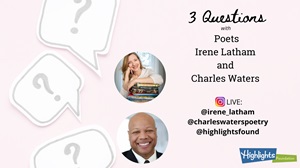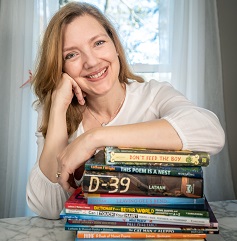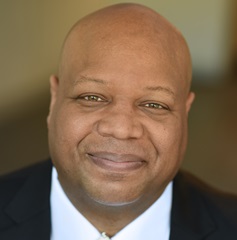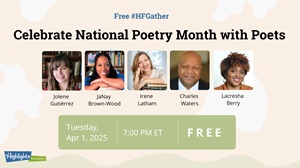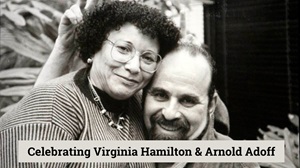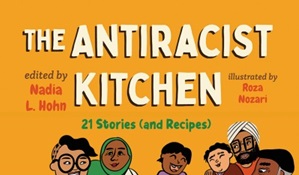Watch the conversation below. (Please note: closed captions are being added to the video below. When they are finished, you can see them by hovering over the bottom of the video and choosing the “CC” icon.)
Full Transcript:
Cat:
A big hello once again to our Highlights Foundation family. We’re so happy to have you here with us twice in a day. How lucky are we? For those that may not know me, I’m Cat Galeano, my pronouns are she/her. I am the social media manager here at the Highlights Foundation, joining you from Westchester, New York, on the traditional lands of the Seewanoy people. Apart from all the fun things I get to do at the Highlights Foundation, I’m also a writer and reading, reader who loves learning, and is very excited to welcome our friends and faculty Charles Waters and Irene Latham, who will be hosting the upcoming Working Retreat: Poetry and Poetry Anthologies, with special guest Carter Hasegawa on June 23rd through the 26th on our Highlights Foundation campus.
But before we dive in, I just want to remind our viewers that joining in on any Highlights Foundation spaces to do so with no hate, no harm and no harassment of any kind.
And now let’s get started! So for my first question, which goes to both of you: you’ll both be co-presenting during the retreat and talking about best practices for creating work for poetry anthologies. Obviously we can’t dive into that because you have to be at the retreat for that. But can you talk about the role that anthologies have played in your own careers and why you’re passionate about them?
Charles:
Well, for me, anthologies helped get me started in the business. One of the things Irene and I have in common is if we have to give somebody a gift, uh, of a book, we’ll try to find a poetry anthology. There’s something about different voices telling a story that can tell a story in, in a totality that maybe a solo poetry collection could not, because you have such diverse voices. So I got started in poetry anthologies and enough people started to see it to ask me to write in more and that led me to Irene, because we had been in enough poetry anthologies that when the idea for our first book, Can I Touch Your Hair? came up, Irene thought of me because we had been in poetry anthologies. And she had seen my writing style, and it’s different from hers. So she thought it would be a match. So I owe a tremendous amount in my book career to poetry anthologies.
Irene:
And I just love reading so much. I have been that kid who, you know, maybe picked up another poetry book and it didn’t suit me. Like I love tender poetry and beautiful poetry and lyrical poetry. But not everybody’s like that. Some people like funny poetry and in an anthology, you can get it all. And so when we started working together, Charles and I, we knew we had these projects. We wanted to write our own material, but we also knew that this was super important to bring anthologies forward. And then we had in 2019, the same year, two wonderful anthologists passed away, Lee Bennett Hopkins and Paul Janeczko. And so we admire their work so much, and we just knew that we wanted to make that a goal of ours. To bring anthologies into the world. And we just followed…our, our styles of poetry are different; are the way we look at the world is different, but that Charles and I, that we can work together and bring something really special.
Cat:
Thank you both for sharing that. I love hearing…because you know, you hear the word “anthologies” and of course, you know that it’s a collection of different people’s voices. But I always love to hear like what it meant for you and your careers, and how that sort of came to be. So thank you for sharing that. So our/my next question is: your next presentation that you’ll be talking about at the retreat will touch on “Diving into the wreck, how to bring forth a treasure of poetry collection.” Something tells me that’s going to at least have something to do with revision. Why did you choose it as your focus?
Irene:
Oh my gosh. I think we all get so excited about drafting. Making the first draft; and then we can start to feel a little lost. Like, we don’t know why it’s not working. Why are the things that I have in my head, why is it not coming across on the page? And that gets magnified when you are looking at a collection and it can be really hard to have the distance from your own work to be able to see the whole collection and what’s working. Where’s the narrative arc? Where’s the structure? What should be the first poem? How are you inviting the reader in? How are you giving the reader a bunch of different emotional experiences across the the whole text?
So I am passionate about, about poetry collections and how to, how to arrange them. Charles and I have conversations all the time and we’re, we’re, we have, you know, a lot of discussion about what should be first, what should be last. And what, what should go in between. So, these are actually things that, that can carry over into anthology work as well. There’s a lot of crossover and what we’ll be talking about, but I think it will help the writers, the poets, to be able to have some really concrete tools. Ways to evaluate your own collection and, and some exercises to kind of go through to kind of put your own collection through the paces and see how you can winnow out the stuff that’s not working and how you can develop your message, which is super important and I think often kind of gets pushed by the wayside because we’re so excited about language and we’re so excited to approach a topic. But what are you really communicating through those, through those wonderful poems? So we’re hoping that we can provide some help in understanding your own collection better and that makes you be able to market it better.
Cat:
Ah, I think that’s worth coming to the retreat alone. Like I’m, I’m over here, like, ooh, I’m, I would love to be a fly on the wall during this, because that sounds so cool. I don’t even write poetry, and I’m like, I would love to know the inner workings of why the first poem is the first one and the last one is the last one and. Oh, that sounds so so fascinating. Charles, do you want to add anything to that?
Charles:
No, Irene pretty much got everything.
Cat:
And that was like a phenomenal answer. I was like, yeah, I’m like–again, not a poet. I’m over here like I want to come to that.
Charles:
Extensive xperience in, in putting poetry collections together for herself, so I, I know when to take a step back and, and Listen to the Latham. And learn a lot it as well, so, yes.
Irene:
Having said that, I’m learning all the time too and in our recent work together, Charles had a brilliant idea for how to, how we should bookend this anthology that we, that we did. So the learning never stops. We learn from each other, don’t we, Charles?
Cat:
I also would like to request a “Listen to the Latham” sticker now so that I could just like put it on my computer and I’m just like listening to all the to the magic coming from you. So that’s so fun. What a fun, fun, OK, arrangement of words. I love it. I love it.
Irene:
…are Charles’s specialty, so.
Charles:
#ListenToTheLatham has got me very far in this business, my friend.
Cat:
I think I’m going to have to hang out with more of you, because I, like I said, I’m not a poet and I’m over here like I think I could do anything now because I’m just like: both of you are so inspiring. So I’m like maybe I should try it. You know what? I, I am loving this energy here. Thank you. So for my third and final question: what do you hope that people leave the retreat with in this journey, in their journey to inspire kids through story?
Irene:
I just, you know, I think the biggest thing that I struggle with, you know…I, I run up on those days where I’m just DONE. Like I just don’t know where, what to do next. I think I’ve done everything I can do, so I hope that through this working retreat. This, you know, we’re going to have a chance to really get to know each other better and the projects that we’re working on. So I guess, encouragement, inspiration, new doorways to walk through, new things to try. Kind of developing a bravery to experiment with some new things and to be open to those possibilities.
Charles:
Well, one of the nice things about this retreat is it’s different from the previous two retreats Irene and I have done, in the sense that a lot of the time the first two times were teaching intensive. Heavy on craft. Heavy on research, that Irene and I would share a process with the attendees. This time it’s flipped where there’s gonna be a lot of time for writing and rewriting and walking in the woods and thinking and coming up with new ideas. And there are, there are teaching aspects to it. You know, Irene and I are teaching twice. Our resident assistant, who I’m excited for everyone to meet, is named Lacresha Berry. She’s a star. She’s a rising star in in the the poetry business. She’s a teaching artist. She’s a playwright. She’s an actor. She’s a longtime educator. She’s performed two one-person shows all over the world, including Wilson Center and Pittsburgh. As well as centers in Kentucky. And what Lucretia is going to do for the attendees is she’s going to have a session where she shows us her process. And then the attendees will be able to maybe share what they’ve learned from her the next day. So that’s something we’re looking forward to as well, but there’s gonna be a lot of personal time.
Irene and I, to quote Sylvester Stallone, are in the Hope business. the Hope business being that we both started this business not knowing what was going on and sometimes we still don’t know what’s going on. We continue to pick up on ideas from other people. We continue to be inpired not only by books, but by the people who wrote or illustrated them. That keeps us going. That’s our nutrition. That’s our vitamins. And so we’re hoping to pass that along to the attendees as well. I’m a sch–I came to highlights in 2011 on scholarship. Thank you, Kent Brown, the founder of Foundation and grandson of Dr. and Mrs. Myers, the founders of Highlights magazine. Because without that, I wouldn’t be talking with you today. And I, and then one of my the smarter things I’ve done, is bring Irene along.
Irene:
I wanted to say thank you, Charles, for brining me along.g
Charles:
I talked about Highlights so long with Irene. Irene was like, listen, to shut this man up, I’m gonna have to go and see what it’s all about.
Irene:
That’s right. Come on.
Charles:
She looked at me, the first day she looked at me and gave me a thumbs up. I was like: “I told you.”
So, I’m really grateful to come back from being a scholarship recipient, as faculty. I’m glad to bring one of the more generous and talented people in our business, and Irene. And we, we hope the attendees just soak up the environment in a safe, non-judgmental environment.
Cat:
Just to kind of add to all that magic you shared. I, I do want to point out that Highlights is a place that, you know, we, we want to, we want to succeed with you. So please, please, like there are if you’re interested in this retreat and perhaps you can’t afford it, we have payment plans. Reach out to us, we want to figure out a way to help you be there with us. We want to support you at the very early stages of your career, at the mid-stages of your career, at the other stages of your career. At your big moment, at your low moments. As, as Charles mentioned, he was a scholarship recipient, is now faculty. So like we want to, to create this like long-lasting relationship with you so. I am so excited for the people that will be attending this retreat because it seems like both of you are so cool. And so well versed that I’m like, wow, I’m telling you. I,I might just sneak over on that June 23rd through the 26th because my birthday is in one of those days. So I’m like maybe I’m, maybe I’ll do a little Highlights retreat.
But yes, I just I think you, I’m sorry?
Charles:
So one thing I wanted to add, I don’t want to forget. Carter Hasagawa from, from Candlewick, will be there. And one of the advantages of Highlights is you cut out the middle person and you go directly to at least talking with an editor in the business, asking questions and getting their thoughts. So I, so I didn’t mean to interrupt you.
Cat:
Tes, of course, absolutely.
So we will have, obviously, the both of you, editor Carter Hasegawa and our retreat assistant Lacresha–I missed the last name, OK. And so I feel like it’s going to be a really great time. There’ll be lots of time for community. Lots of time for learning and even more time to write and rewrite so. I think it’s a total package, people. I think you need to really, really, sign up right after we finish.
Irene:
We want to meet you. We wanna, we wanna hear your poems.
Cat:
I,I,you know what? I might have to have a little conversation with programming. But is there anything else you’d like to add before we wrap up?
Charles:
Spaces are becoming limited, so please sign up, everybody. We’re very grateful that, that it’s filling up. We’re not quite at capacity, so, please if, if you can, invest in yourself and there, there’s no better way to say “I matter as a creative person” than investing in yourself and coming to a retreat like this because it shows you care about you and your journey.
Irene:
That was so touching, thank you.
Cat:
I felt that to my bones as a writer struggling too. I’m like ah! Irene, did you want to add anything else?
Irene:
No, just, just gratitude and looking forward to summer and on the beautiful campus so.
Cat:
So in that case, I’m going to wrap up for all of us. Poets and writers, f you’d like to retreat with Irene and Charles, Lacresha and Carter, join them on the beautiful Highlights campus in the Poconos, June 23rd too the 26th, you can register on our website highlightsfoundation.org and lastly you can purchase Charle’s and Irene’s books at our virtual bookshop powered by bookshop.org. Thank you, Charles. Thank you, Irene, for joining us today. And we can’t wait to see you on campus.
Irene:
Thank you, Cat.
Charles:
Bye bye.

